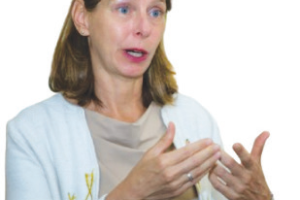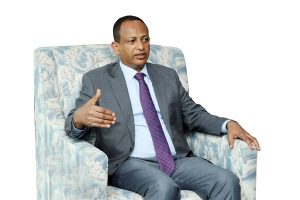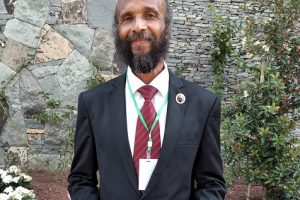BY ADDISALEM MULAT
Today’s exclusive column guest goes by the name of Dr. Lakew Assefa. He is the head of the Department of Dentistry at the School of Medicine, College of Health Sciences, Addis Ababa University.
On a different note, the dentistry department is accomplished by means of oral and maxillofacial surgery unit, restorative dentistry unit, prosthodontics unit, orthodontist unit, orthodontist unit, pediatric dentistry unit, pediatric dentistry unit, periodontics unit, cleft lip unit, and palate unit.
Of late, The Ethiopian Herald had a short stay with Dr. Lakew Assefa. He has touched upon a diverse range of issues bringing to a focus on oral hygiene, dental medicine, oral medicine, and things of that nature. Excerpts:
Would you please tell us about the nuts and bolts of the department of dentistry?
By way of introduction, the dentistry department has been providing vast quantities of services for the community at large sojourning all over the capital and its environs since its establishment every once in a while. Amongst other things, the department gives service for more than a hundred people a day in association with oral and dental diseases at a customary and reasonable charge.
As the various units of the department attach weight to gum disease, fractured teeth, exposed roots, cracked or broken teeth, sensitive teeth, gum diseases, and all that kind of crap, we give prominence to customers more than anything under the sun. Speaking of which, no exaggeration to say their satisfaction is one of our priorities.
Aside from giving training to quite a lot of dental students at different levels, we have been pulling out all the stops in furtherance of bridging gaps hovering around medical and oral healthcare despite we stumble upon some difficulties at certain times.
Along the same lines, as Ethiopia does not possess the passable amount of Canal Specialist, Oral and Maxillofacial Surgeon, Alignment Specialist, Pediatric Dentist, Gum Specialist and more of the same, we have been bending backward with the object of materializing our dreams despite we do not know what the future holds in store for the department of dentistry.
Can we conclude that the department of dentistry is attaining the envisioned target at this particular moment?
In the first instance, we have been moving heaven and earth in enforcement to making the department of dentistry stand on its own feet. We have been passing through many ups and downs with a focus on turning a vision into a reality and fulfilling the school’s needs at the earliest possible date.
Strictly speaking, if pertinent bodies stand by our side without any mental reservation, the department of dentistry can embark on bearing fruit as soon as is practicable beyond a shadow of a doubt. On this account, concerned bodies should be able to get underway spreading their wings for the love of making the department reap the fruit of achievement in one instant.
To the best of my knowledge, they do not have to turn a blind eye to the problem provided that it needs swift measures to be taken before the situation moves into uncharted territory.
What was the department of dentistry like in the olden days?
Before all else, in the 1950th and 1960th the Ethiopian Red Cross was taking advantage of the school for training nurses. In spite of everything, with the passage of time, the Ministry of Health embarked on giving training for dentists in collaboration with the government of Italy and graduated quite a lot of students. Over the course of time, the school fell under the supervision of the Ministry of Health and jumpstarted offering training for mid-level dental providers.
In the fullness of time, the school managed to graduate the first advanced diploma students without a hitch. At that exact moment, the school managed to graduate the first and second-round students in dentistry. Furthermore, as time went by, after passing through many twists and turns, the school managed to graduate the first doctorate dentistry program which later fell under the supervision of the Addis Ababa University.
As far as this, the dentistry department managed to graduate dentistry students at different levels. Slowly but surely, it ended up graduating 72 students for the fourth time in doctorate and the first 55 dental therapists.
What difficulties have you come across on the subject of dental students up to this point, if any?
When one considers among the teaching methods in health and medical education, clinical learning is most fundamental given that it behaves towards real complications within the ambit of professional practices. Through it, students can dynamically involve and develop skills as an illustration oral examination, logical reasoning, decision making, empathy, and professionalism.
In the same manner, clinical practice is considered essential to professional competence in most healthcare-related professions. Dental students’ training is accomplished by means of clinical practice under supervision by qualified dentists.
Apart from that, the learning environment of the clinic or hospital can be challenging for both mentor and learner based on the stresses involved in dealing with clinical cases.
Most of the obstacles of clinical learning are on the basis of mentors, students, and supportive staff. For example, coordination of learning sessions, supervision skills, teacher-student relationships, the selection and structuring of learning objectives can all affect learning outcomes.
Along the same lines, unsupportive staff and the unavailability of facilitating resources are mentioned by dental students’ factors. The challenges of the clinical learning environment are not well studied in dentistry and no study has been carried out in Ethiopia in this area.
In addition to that assessment of clinical practice and challenges are a determining factor in the planning of educational intervention for university teachers and clinical mentors in workplace settings.
Providing training for new graduates’ instructors, allocating enough budgets, opening additional residency programs, creating links to other higher learning institutions of the country, and all that kind of trap play a major role in bridging gaps beyond a doubt.
On top of that, adequate dental instruments and materials, interested and motivated instructors, and a supportive clinical environment are significant in clinical learning.
How would you describe the current challenges of the department of dentistry?
To be totally honest, all without exception have been working around the clock throughout the day. They leave no stone unturned to take the density department to a new height of achievement in a short space of time.
We have been working against all odds with the intention of boosting its economic muscle down the road. To this end, we all work like two peas in a pod for the renaissance of the department and give service to customers at full capacity.
Similarly, we kick an enormous amount of issues related to the dentistry department and come up with all manner of solutions.
What problems have you encountered in due course of discharging your duties?
Every now and then, we focus on our job. When the need arises we request dental materials needed without batting an eyelid. Properly speaking, most of them cost an arm and a leg. As I have tried to mention so far, in spite of the fact that the dentistry department comprises Oral and maxillofacial Surgery, Restorative dentistry Unit, prosthodontics unit, Orthodontist unit, Orthodontist unit, and others, we are not operating at full capacity due to lack of adequate dental materials. We do need dental materials to be fulfilled at the earliest time possible.
Against this background, we do need pertinent bodies to place much importance on the department of dentistry. To the surprise of everyone, the school has not distanced itself from providing services to its customers in the course of the COVID-19 pandemic for a single day even. We made every effort not to interrupt the service provided that we did not want any one of them to suffer from dental problems owing to lack of treatment.
What is your take on the various dental clinics positioned all over the country?
According to my way of thinking, the wider community does not have to be dependent on the print and electronic media outlets of the country on the topic of dental advertising that makes the lives of the general public worse and empty their pockets. As if money grows on trees, private dental clinics situated in every corner of the country charge a higher amount of money for simpler treatment. Instead of lending their ears and exposing themselves to danger, the entire population should be able to discover everything going on behind the scenes.
As things stand at present, a television advertisement is exposing people to danger and giving them a hard time. As media owners attach importance to the income they get from advertisements, they do not place emphasis on the wellbeing of the community at large. As ill would have it, as most people go to different private dental clinics based on various information they get from various media outlets, they have been failing to attain the wished-for target.
What we watch on TV and practical see with the naked eye in a wide spectrum of the private dental clinic is entirely different. They are like chalk and cheese. To everyone’s dismay, in some areas, the dental treatment is given by inappropriate people who do not have a wee drop of an idea about a wide array of dental diseases.
As dental problems do need special attention, they should be treated with dentists who know the nuts and bolts of dental treatments like the back of their hands.
In similar fashion, whenever relevant bodies issue a license, they should be able to crosscheck the whole lot required to open a dental clinic. They need to have an idea about the whole lot going on behind closed curtains.
What measures should be taken to get to the bottom of the problem at the earliest possible time?
Before anything else, we are bending over backward to get to the bottom of the problem through the Ethiopian Dental Professional Association. In actual fact, a lot is expected of the association before the situation embarks on getting off track. In some dental clinics, people with minor common dental problems are expected to pay a huge amount of money.
This is not really fair. They should be concerned about their compatriots instead of fattening their pockets at the expense of their compatriots. I do believe the problem will be under control through the passage of time.
What should be done to take the department of dentistry to the next level of accomplishment?
Private investors should be able to work in collusion with concerned bodies with the purpose of getting to the bottom of the problem at the earliest possible time and help the population as a whole have access to dental treatment at a customary and reasonable charge.
In the same way, as the dentistry department does not possess enough professionals in dentistry, we should put an accent on increasing the number of professionals in dentistry and expanding the service more than ever before.
As most people with dental problems spend a huge amount of money in various private clinics, we do need them to come to our dentistry department to get service at a fair price.
The Ethiopian Herald January 2/2021




